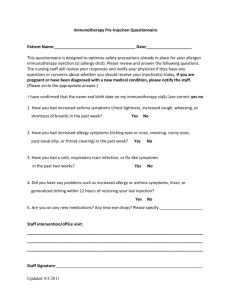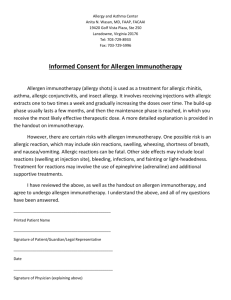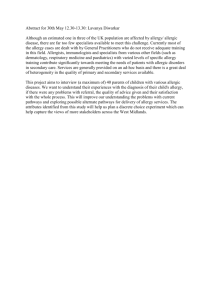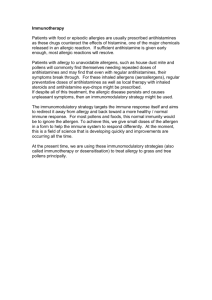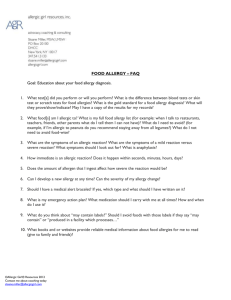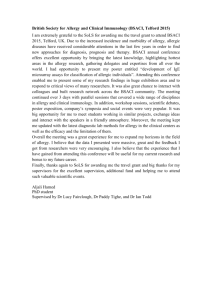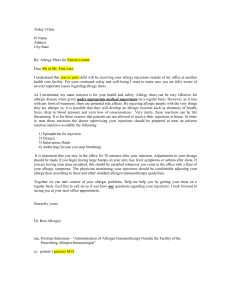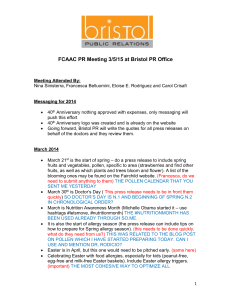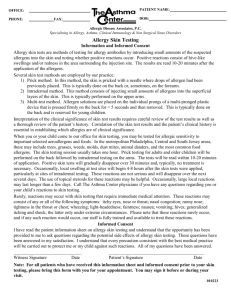Instrutions_for_Allergy_Skin
advertisement
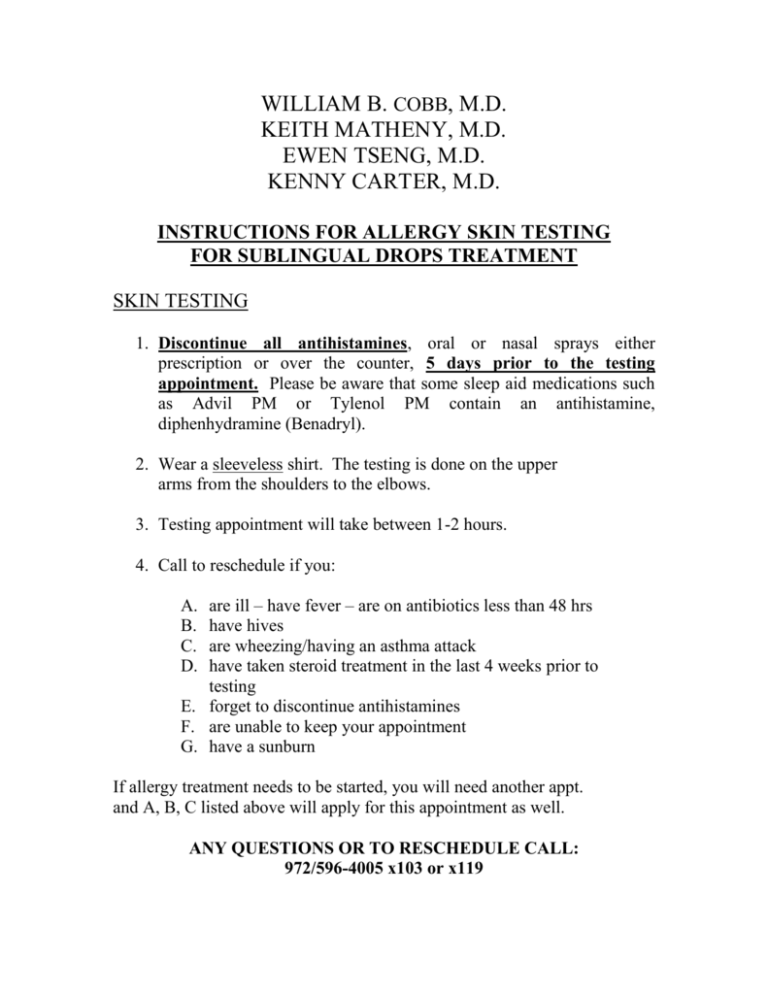
WILLIAM B. COBB, M.D. KEITH MATHENY, M.D. EWEN TSENG, M.D. KENNY CARTER, M.D. INSTRUCTIONS FOR ALLERGY SKIN TESTING FOR SUBLINGUAL DROPS TREATMENT SKIN TESTING 1. Discontinue all antihistamines, oral or nasal sprays either prescription or over the counter, 5 days prior to the testing appointment. Please be aware that some sleep aid medications such as Advil PM or Tylenol PM contain an antihistamine, diphenhydramine (Benadryl). 2. Wear a sleeveless shirt. The testing is done on the upper arms from the shoulders to the elbows. 3. Testing appointment will take between 1-2 hours. 4. Call to reschedule if you: are ill – have fever – are on antibiotics less than 48 hrs have hives are wheezing/having an asthma attack have taken steroid treatment in the last 4 weeks prior to testing E. forget to discontinue antihistamines F. are unable to keep your appointment G. have a sunburn A. B. C. D. If allergy treatment needs to be started, you will need another appt. and A, B, C listed above will apply for this appointment as well. ANY QUESTIONS OR TO RESCHEDULE CALL: 972/596-4005 x103 or x119 WILLIAM B. COBB, M.D. KEITH MATHENY, M.D. EWEN TSENG, M.D. KENNY CARTER, M.D. Immunotherapy/Skin Testing Information/Acknowledgement ACKNOWLEDGEMENT OF INFORMATION READ ON ALLERGY SKIN TESTING AND ADMINISTRATION OF IMMUNOTHERAPY - SUBLINGUAL DROPS PLEASE READ AND BE CERTAIN YOU UNDERSTAND THE FOLLOWING INFORMATION PRIOR TO SIGNING THE CONSENT FOR TESTING OR TREATMENT. INDICATIONS FOR SKIN TESTING The patient has seen the doctor, physician assistant, or nurse practitioner with allergy symptoms and has tried the typical medications such as antihistamines/decongestants, steroid nasal sprays without successful symptom management. This procedure is to determine if a patient is allergic to an airborne pollen/allergen. PROCEDURE FOR SKIN TESTING The patient has been instructed to discontinue all antihistamines 5 days prior to scheduled skin test. There is a panel of antigens (pollens, molds, dust mites, and cat & dog) that are administered individually in the subcutaneous tissue on the upper arms. The antigens used are native to this area. Upon beginning, each allergen is administered at a very weak dilution. If the antigen does not reveal positive in a formulated measurement, the allergy technician will then administer a stronger dilution of the same antigen. There are 5 dilutions the technician may use. If none of these show a positive reaction by measurement on the skin, the patient is not allergic to that specific antigen. All reactions are recorded and the record is shown to the doctors for determination of treatment. PURPOSE The purpose of sublingual immunotherapy is to decrease your sensitivity to allergycausing substances, so that exposure to the offending allergen (pollen, mold, mites, and animal dander) will result in fewer and less symptoms. This does not mean that immunotherapy is a substitute for avoidance of known allergens or for the use of allergy medications, but rather is a supplement to those treatment measures. Sublingual immunotherapy is known to lead to the formation of “blocking” or protective antibodies and a gradual decrease in the allergic antibody levels. These changes may permit you to tolerate exposure to the allergen with fewer symptoms. You, in effect, become “immune” to the allergen. The amount of this immunization is essentially the same for each person unless reactions occur and the doses have to be adjusted. In most patients this takes approximately 3-4 years from the time a maintenance level is reached in the treatment. INDICATIONS FOR IMMUNOTHERAPY To qualify for immunotherapy, there must be documented allergy substances in the environment that cannot be avoided. Documentation of allergy is either in the form of a positive skin test or a positive blood test. In addition to demonstrable allergy by one of the mentioned tests, problems such as hay fever or asthma should occur upon exposure to the suspected allergen, or you may have history or a severe reaction to an insect sting. Due to the inherent risks of immunotherapy, avoidance measures and medical management should be attempted first. EFFICACY Improvement in your symptoms will not be immediate. It usually requires 3 to 6 months before any relief of allergy symptoms is noted, and it may take 12-24 months for full benefits to be evident. About 85-90% of allergic patients on immunotherapy note significant improvement of their symptoms. This means that symptoms are reduced, although, not always completely eliminated. PROCEDURE Allergy drops usually begin at a very low strength. This dosage is usually administered 3 times per day per week for approximately 12 weeks. After this time, the drops are increased in strength given the same way as the first level. The goal is to achieve a therapeutic strength, often called the “maintenance level”. The maintenance level will differ from person to person. The frequency of the drops reduces the chance of reaction and permits the maintenance level to be reached within a reasonable amount of time. After the maintenance dose is achieved, there will be no increase in strength of the drops. DURATION OF TREATMENT It usually takes 6-9 months to reach a maintenance dose level depending on the severity of allergies. This time may be longer if there are reactions or if the allergy drops are not taken on a regular basis. For this reason, it is very important that the recommended dosing be followed. If you anticipate that you cannot maintain the immunotherapy dosing, you should not start the treatment. Immunotherapy may be discontinued at the discretion of one of Dr. Cobb, Dr. Matheny, Dr.Tseng, or Dr. Carter if the drops are frequently missed, as there is an increased risk of reactions under these circumstances. Most immunotherapy patients continue treatment for 3-4 years, after which the need for continuation is reassessed. INITIAL EXTRACT PRESCRIPTION Your initial prescription includes all of the antigens you tested positive to on the initial testing at the 1st level of treatment. In order to use these vials prior to their expiration date – 3 months from the date of preparation – you will need to administer the drops as scheduled. If the vial expires before the expected completion time of this level, an evaluation will be made to determine remixing the serum. NO VIAL WILL BE RELEASED UNTIL YOU HAVE AN EPI-PEN AND HAVE BEEN EDUCATED ON ITS PROPER USE IN AN EMERGENCY *Each time a new vial is dispensed, you will need to bring your Epi-pen to maintain a record of its expiration date with your allergy records. PREGNANCY Females of childbearing age: If you become pregnant while on immunotherapy, notify the allergy department staff so your doctor may determine an appropriate dosage. Immunotherapy will not be increased during pregnancy, but may be maintained at a constant level. The decision however, must have the consent of your obstetrician. NEW MEDICATIONS Please notify the allergy department staff if you have any new prescription medications, particularly medication for high blood pressure, migraine headaches, and glaucoma. “Beta Blocker” medications change our emergency protocol for treatment of a generalized (systemic/anaphylactic) reaction. SIDE EFFECTS/REACTIONS TO ALLERGY DROPS Since allergy drops contain the very allergens to which you are allergic, they occasionally cause reactions. The symptoms may occur soon after your allergy drops or may occur to a milder degree later. Severe reactions tend to begin very promptly after administration. (A) Normal local reactions/side effects: Mouth itching *If mouth itching develops, take an antihistamine. For a quicker response you may also take a liquid antihistamine sublingually (under the tongue). *Consider decreasing your dose to one per day; build back up to 3 times per day as tolerance increases (typically 1 dose a day for 3 days, 2 doses a day for 3 days, then back to 3 doses a day). Stomach ache *Consider decreasing you dose to one dose a day; build back up to 3 times a day as tolerance increases (typically 1 dose a day for 3 days, 2 doses a day for 3 days, then back to 3 doses a day). (B) Systemic allergic reaction: On rare occasions a highly sensitive individual may develop symptoms of a systemic allergic reaction. These symptoms will possibly consist of itching or swelling of the throat, nose eyes, palms and skin; hives, sneezing, runny nose, coughing, and wheezing. If these occur, take an antihistamine (e.g., Benadryl, Allegra, Clarinex, Zyrtec, Xyzal, etc…) and/or bronchodilator (quick relief inhaler anti-wheezing medication), go to the nearest emergency facility, or call 911. If symptoms continue, administer your Epi-pen. REPORT ANY IMMEDIATE OR DELAYED ALLERGIC REACTION BEFORE YOU ADMINISTER YOUR NEXT ALLERGY TREATMENT SO THAT THE PROPER ADJUSTMENT CAN BE MADE. If you have any questions, please contact the office at 972/596-4005 x103 or x119.
